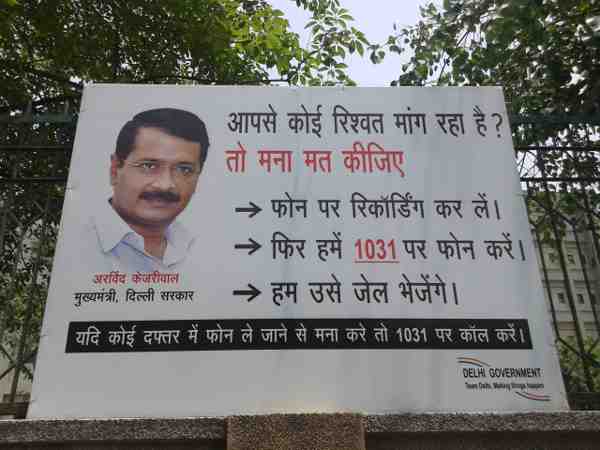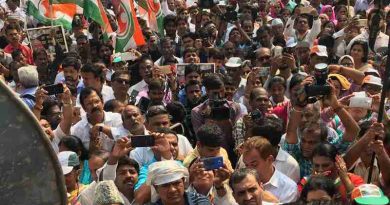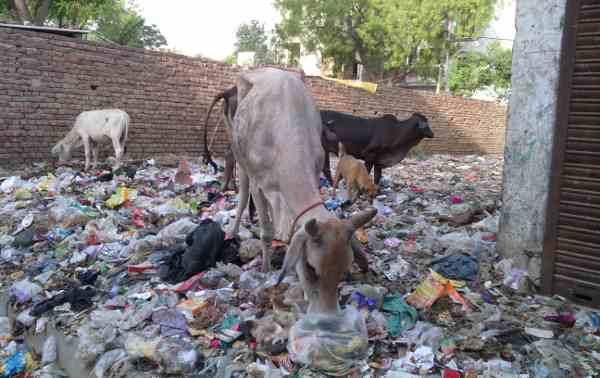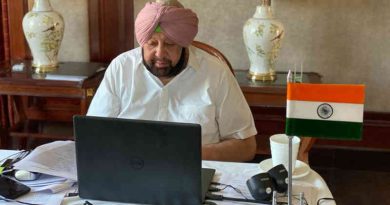Can Delhi Government Stop Corruption? No Way.

Delhi government fails to understand that bureaucratic inefficiency is the worst form of corruption – worse than even bribe.
By Rakesh Raman

It was Saturday morning on May 16 at around quarter past ten when I called the Delhi phone number 1031. A very polite woman voice greeted me from the other side. The conversation happened in Hindi language for about 7 minutes.
I had taken the 1031 number from an ad hoarding put up in the city by the Delhi government with a picture of the chief minister Arvind Kejriwal.
The ad screams that if somebody demands bribe from you, don’t refuse, record their voice on your mobile phone and call 1031. Then Delhi government will send the corrupt official to jail.
Although I tried it, I haven’t seen such a confusing ad before. The ad didn’t mention if some inquiry will take place on the allegation against the official. If it would, then how much time will the government take to complete the inquiry and what will be the jail term if the official is found guilty?
Moreover, will the work for the complainant be done after sending the corrupt official to jail? You don’t know. Communications is an art that Delhi government doesn’t understand.
Surprisingly, this anti-corruption service is available only for those who own a mobile phone and are quite familiar with its voice recording feature. There are plenty of other flaws in the ad message.
[ Aam Aadmi Party Welcomes You to Dirty Delhi ]
In my phone conversation on 1031, I told the woman who was receiving my complaint that a Delhi government office is not demanding bribe from me openly but the officials are not responding to my repeated complaints about a case. The case is stuck in government files for years.
“Is it not a tacit demand for bribe?” I asked. There was no satisfactory reply from the other side. I was only told that my conversation was being recorded and it will be forwarded to the concerned officers. Who are those officers? The woman refused to tell me.
I told on 1031 that inefficiency in government offices is also a form of corruption and the government should immediately terminate the services of inefficient workers or officers, and perhaps they must be jailed.
[ How to Deal with Vehicular Pollution in Delhi ]
Unfortunately, without defining the meaning of corruption, the Delhi government claims that it is fighting corruption. While the government says people can use the anti-corruption helpline to report about the corruption cases, only God knows the effectiveness of this service.
Delhi government informs that it’s sending the complaints to some anti-corruption branch (ACB). So what? What will this anti-corruption branch do? Is Delhi government working as a mere postman to forward people’s complaints? Are people getting relief? How will it end corruption?
Government is silent on all these questions. Why? Because government is not interested in weeding out corruption. Its only agenda is to put Kejriwal’s picture on roadside hoardings and gain cheap publicity for him? As usual.
[ Is New Delhi the Dirtiest City of the World? ]
Kejriwal and his government are clueless about the severity of corruption that is happening at an alarming pace in Delhi. Today, every government department in India including Delhi is full of bureaucratic parasites. These government workers – rather shirkers – sit on official files like poisonous snakes. They simply don’t want to work. As a result, inefficiency is rampant in government offices while citizens keep suffering as their work gets stuck.
Most government workers don’t ask for bribe openly but they stop working on citizens’ applications or representations. As a result, poor citizens are forced to bribe to get their work done. Such bribery cases can’t be recorded on phones, as the government officer has not asked for bribe, but the citizen is quietly forced to bribe.
[ How FBI Plans to Tackle International Corruption ]
Delhi government fails to understand that bureaucratic inefficiency is the worst form of corruption – worse than even bribe. The government doesn’t want to address this corruption because it doesn’t understand the meaning of corruption.
The government also doesn’t tell you if there is a helpline to report about such bureaucratic corruption in the form of inefficiency. Plus, the Delhi government doesn’t respond to citizens’ e-mails and letters. If you write an e-mail to Delhi’s chief minister, you only get an automated message, which says, “The CM receives a large number of mails everyday so there may be a delay in responding.” But there is a complete uncertainty about the amount of delay.
The message further says that “if your email is related to a complaint or a grievance, We would request you to please register it at www.pgms.delhi.gov.in, which is Delhi Government’s central complaints portal.”
Like other government websites, this portal is full of flaws. With clumsy interface, it doesn’t allow you to enter the hyperlink of a webpage and asks you to write your complaint in just 2000 characters (roughly 250 words).
Obviously, the Delhi government doesn’t understand the relevance of communications. But where should citizens go to complain and get relief?
If Kejriwal really wants to address corruption, he must make very efficient e-governance interfaces to completely stop the physical interaction between citizens and sarkari babus (government workers). Corruption happens only when there is a physical interaction between citizens and the government.
The current e-channels of Delhi government to deliver citizen services are so ridiculously primitive that they can’t be used as effective interfaces between citizens and the government.
The revamped e-governance systems must show end-to-end movement of each file graphically and send automatic alerts to monitoring agencies as well as the complainants or applicants if the case gets stuck at any level. Government workers should be jailed if citizens’ work gets delayed because of official carelessness.
There are plenty of other steps that Kejriwal can take to eradicate corruption if he is serious to do so. Alas, he is not serious.
Corruption runs in government officers’ blood. You will be living in a fool’s paradise if you expect Delhi government to weed out corruption from Delhi. So, let’s learn to live with Delhi’s corruption. Okay?
By Rakesh Raman, the managing editor of RMN Company
You also can read: More Articles by the RMN Editor, Rakesh Raman




